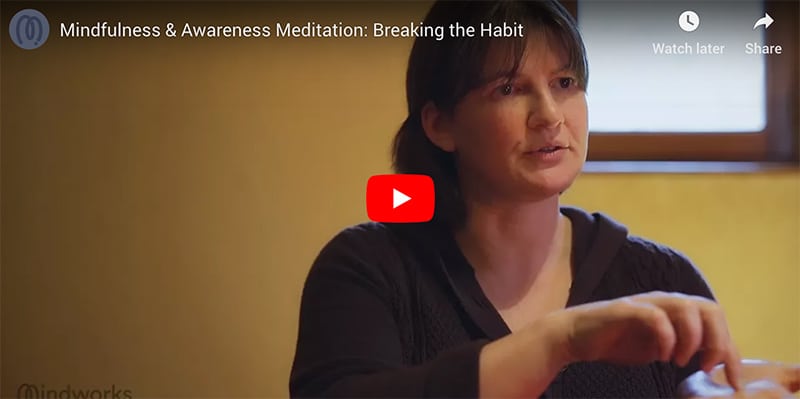Disrupting Habitual Patterns Through Meditation
Category: Mind Trainer Articles | Mindfulness and Awareness | Popular

Habitual Patterns Limit Our Options and Hold Us Hostage
Due to the tendencies we create out of habit, our thoughts and emotions default to a habitual response. Without awareness, we dig ever-deeper grooves into our minds: habitual patterns of behavior that can be either positive or negative. Through awareness practice we can begin to see this process, and over time can disrupt it.
Every time we have a thought, it can be present for just one instant as it arises and passes by, or we can repeat it to ourselves over and over. For me, it’s like water—if you pour a drop of water on the earth, it can go anywhere. But if that drop starts to take a certain path, and the next drops follow, after a while the water will make a groove. Each time a drop goes down that pathway it creates a deeper groove and the options become more and more limited.
Meditation Awareness Leads to Greater Mental Freedom
The awareness we develop in meditation is a way of getting us back to square one, where the water now has options of where to flow. Awareness is the key to resolving problems caused by our habitual responses. Let’s take the example of recurring fears. Maybe we’ve been in, or witnessed, a car accident, so whenever we think “car” we react to that in a certain way. And each time we have this reaction, we deepen the groove so the next time the stimulus appears, we have exactly the same reaction.
But with awareness, we recognize what’s happening in the moment so that each time an experience arises it creates a new awareness. Each time, we become aware a little more quickly. Eventually, we find ourselves recognizing our habitual tendency the very instant it arises. This is the moment where we have different options. The water doesn’t have to go down that same channel because we’re at a place where we can direct a falling drop in different ways. We’re aware; we have choices. The stronger our awareness practice is, the greater our freedom and skill in understanding our tendencies and how best to work with them.
We can apply this practice to the habitual tendencies that always seem to arise with family members, difficult co-workers, etc. Generally, habitual patterns dictate our reactions because we’re not aware of them and catch them too late – if at all. Without awareness, we’re swept away, we’ve already reacted. It all went too fast, we didn’t catch it in time. But with awareness we can see our tendency the moment it manifests and change our response to something more workable, more beneficial. Meditation is the perfect training. If, in meditation, we develop the powerful habit of coming back to the breath when something, anything arises in the mindstream, we are training in maintaining awareness in all sorts of situations. We have disrupted the habitual pattern, and now the water has somewhere new to go.
I remember one time when I was in a meditation retreat and someone used up all the honey. No honey would be coming in for another week and people in our small retreat group became upset about it. At the time I was doing the shopping. In that magnified context, the little pot of honey that was missing became this massive two-ton pot of honey. Later, when I went out to get more, the massive imaginary pot of honey shrunk back down to the little pot it actually was, and my perspective totally changed.
When certain conditions are present, things get out of proportion. And it’s only due to awareness that things shrink back to normal. They fall back into proportion and we can have a more balanced and sane relationship with what is going on. Along with awareness, we are also cultivating a kind of confidence in resting with the breath. Try it and see for yourself what subtle changes it brings about. Once you’ve had the experience, you can keep it in your pocket and use it when you find yourself in a habitual “trigger” situation.
Meditation Awareness Doesn’t Only Happen on the Cushion
Meditation isn’t something that only happens on the cushion. Awareness, focus and presence are there when we’re sitting; there’s no reason they can’t be there every moment of your life. When intense situations occur and create fear, anxiety or conflict, normally that’s when you’re the most liable to be swept away. But in fact because it’s such a strong experience, because it’s so in your face, it’s actually the easiest moment for you to tag it and react differently! Subtler thoughts and fears are actually bad habits that are more difficult to work with because they tend to remain hidden; you don’t really see them. Often it’s the big things that bring you back to your training and remind you that you have this tool, this gift or good habit that you can use to change your experience of the situation. When you change your experience, you effectively change the whole situation. It may not be possible 100% of the time, but your reactions can potentially be more measured and sane because you’re aware. There is a huge difference between reacting through unawareness and acting through awareness.







